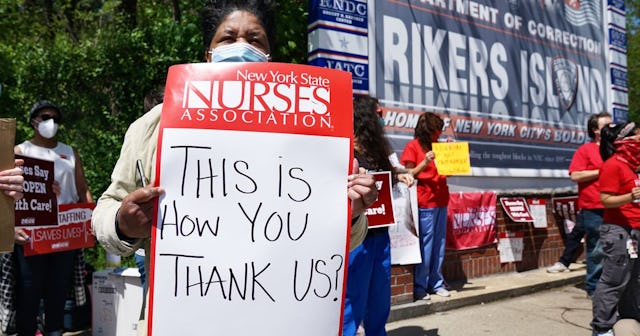Trump Admin Killed Rule Meant To Protect Healthcare Workers Amid Pandemics

The regulations were meant to go into effect in 2017
After Trump was elected, his administration stopped work initiated by then-President Obama which looked at creating federal regulations aimed at preparing the health care industry for an airborne infectious disease pandemic like the one it’s now facing, making hospitals and nursing homes safer when the next pandemic arrived. Trump has repeatedly blamed the Obama administration and state governors for hospitals not being prepared for COVID-19.
“If that rule had gone into effect, then every hospital, every nursing home would essentially have to have a plan where they made sure they had enough respirators and they were prepared for this sort of pandemic,” said David Michaels, head of Occupational Safety and Health Administration (OSHA) under Obama. “H1N1 made it very clear OSHA did not have adequate standards for airborne transmission and contact transmission, and so we began writing a standard to do that.”
According to NPR, there are no current regulations in place that would protect health care workers from airborne viruses like influenza, tuberculosis, or a coronavirus. During the H1N1 outbreak, thousands died — some of them nurses caring for patients without potential lifesaving equipment as shortages of PPE were found. COVID-19 has devastated nursing homes, care centers, and hospitals caring for those who have contracted the virus.
Trump addressed these regulations during his first year in office as they were set to begin in 2017. “Earlier this year we set a target of adding zero new regulatory costs onto the American economy. As a result, the never-ending growth of red tape in America has come to a sudden, screeching and beautiful halt.”
Just three years later, the country is seeing the impact of those deregulations as front line responders get sick and die as a result of caring for patients. “The infectious disease standard was put on the back burner. Work stopped,” said Michaels, now a professor at George Washington University.
“Even just a few months ago, I couldn’t have imagined that I would have been on a Zoom call reading out the names of registered nurses who have died on the front lines of a pandemic,” said Bonnie Castillo, who heads the National Nurses United union. “The memorial was not only about grief. It was also about anger.”
Democrats in the House of Representatives passed a bill in mid-May in an effort to bring back the regulations which would guarantee more preparedness in the health care industry, but the Senate blocked the measure leaving many worried about future outbreaks that are likely to occur later this year, according to experts.
The new head of OSHA appointed by Trump believes there are enough rules in place to protect our nation’s healthcare workers. “We have mandatory standards related to personal protective equipment and bloodborne pathogens and sanitation standards,” Loren Sweatt told NPR. “We have existing standards that can address this area.”